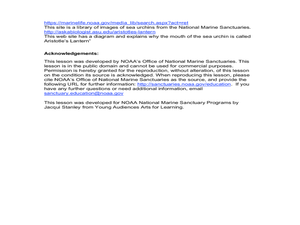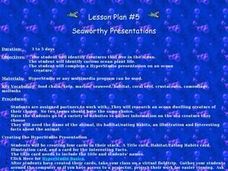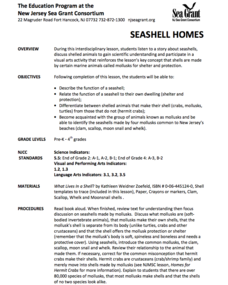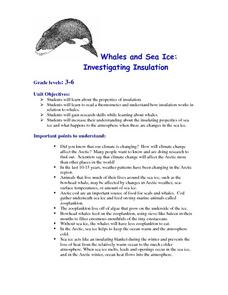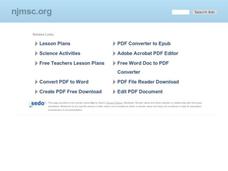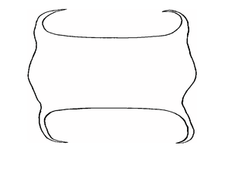Curated OER
What Do You Know About Horseshoe Crabs?
High schoolers create a learning tool based on information given on the assigned website. In this ocean life lesson, students read about the horseshoe crab and develop a worksheet, scavenger hunt, board game or any tool to aid learning....
Curated OER
Sea Urchins - Diadema Antillarum
Students investigate oceanography by painting sea life. In this crustacean lesson, students identify sea urchins in our ocean environments and describe the functionality of their spherical-shaped bodies. Students design their own sea...
Curated OER
Aquatic Safari
Students use an Internet Web site to locate the scientific information about various marine species. They use the Internet to find the scientific information about marine animals.
Curated OER
Crab Crossword Puzzle
In this crab worksheet, students read ten clues that pertain to sea crabs. Students match these to vocabulary words in a box. Students fit their answers in a crossword puzzle.
Curated OER
Crab Word Search
In this crab word search worksheet, students locate and identify 8 crab-related words within the word search puzzle.
Curated OER
Homes for Hermit Crabs
Students discover the differences between hermit crabs and mollusks and identify their parts. After reading a story about hermit crabs, they complete an anatomy worksheet. For another activity, students fold and cut a diagram of a hermit...
Curated OER
Seaworthy Presentations
First graders research ocean animals and plants on the web. For this ocean habitat lesson, 1st graders prepare a multimedia presentation. Students will work on their presentations in pairs and every group should have its own animals or...
McGraw Hill
Arthropods
Are spiders related to crabs? Study the order of arthropods with a reading selection about animal diversity. It provides details about each class within the order, as well as vivid pictures and explanatory charts.
Curated OER
Love A Lobster
Learners discuss the appearance of a lobster. Using pre-cut parts, they create their own lobster and name each part of its anatomy. As a class, they listen and participate in exploring background information on the lobster and its...
Curated OER
Life is Weird
Students study the organisms that are found in cold seeps and see how they interact with each-other. In this biological organism lesson students describe the major features of cold seeps and the process of chemosynthesis.
Curated OER
Seashell Homes
Pupils listen to a story about seashells. They discuss shelled animals. Learners describe the function of seashell. Pupils relate the function of a seashell to their own dwelling. They differentiate between shelled animals that make...
Curated OER
How Big Is A Humpback Whale?
Students explore humpback whales. For this humpback whale lesson, students determine the actual size of humpback whales and use diagrams to identify the major features of the humpback whale.
Curated OER
Habitats and Adaptations
Students research and describe the habitat and adaptations of a reef animal. After the student is assigned a habitat, they design and draw a cresture adapted to eat each food and to live in each habitat.
Curated OER
Whales and Sea Ice: Investigating Insulation
Young scholars investigate the properties of insulation as it relates to whales and sea ice. They research whales and examine the atmospheric changes that occur when there are changes in sea ice.
Curated OER
The Effects of Temperature Variations on the Heartbeat Rate of Daphnia
Young scholars use DigiScope technology to investigate Daphinia, popularly known as water fleas. They design, conduct, and report on an experiment to determine the effects of varying water temperatures on the heartbeat rate of Daphnia.
Curated OER
Arthropods Crossword
In this arthropods worksheet, students complete a crossword puzzle with 41 questions about the different types and behaviors of arthropods.
Curated OER
Ocean Market
Students identify some consumer goods that come from the ocean.
They classify these items into groups, identify their source, and calculate the cost of buying such goods.
Curated OER
Loggerhead Turtle
In this science worksheet, students color in the picture of the loggerhead turtle and read the fact sheet that focuses upon its classification.
Curated OER
Invertebrates
In this invertebrates worksheet, students read about the characteristics of the different groups of invertebrates. Then students complete 10 multiple choice questions.
Curated OER
Ocean Vocabulary
In this vocabulary instructional activity, learners match words related to the ocean to their definitions. Worksheet is labeled as a quiz, but may be used as review/practice.
Curated OER
Adaptations-What a Concept
Students study the pink river dolphin and how it has adapted to its environment. In this adaptations lesson students construct a map that represents certain relationships.
Curated OER
AUSTRALIA
Learners examine the different types of barrier reefs and how they are formed. In this barrier reef lesson students complete several activities on coral reefs.
Curated OER
Skates
Students gain understanding of structure, characteristics, and basic needs of living things and their role in world, identify parts of skate, observe details of skate's body and skate egg case, and identify unique characteristics of skates.



